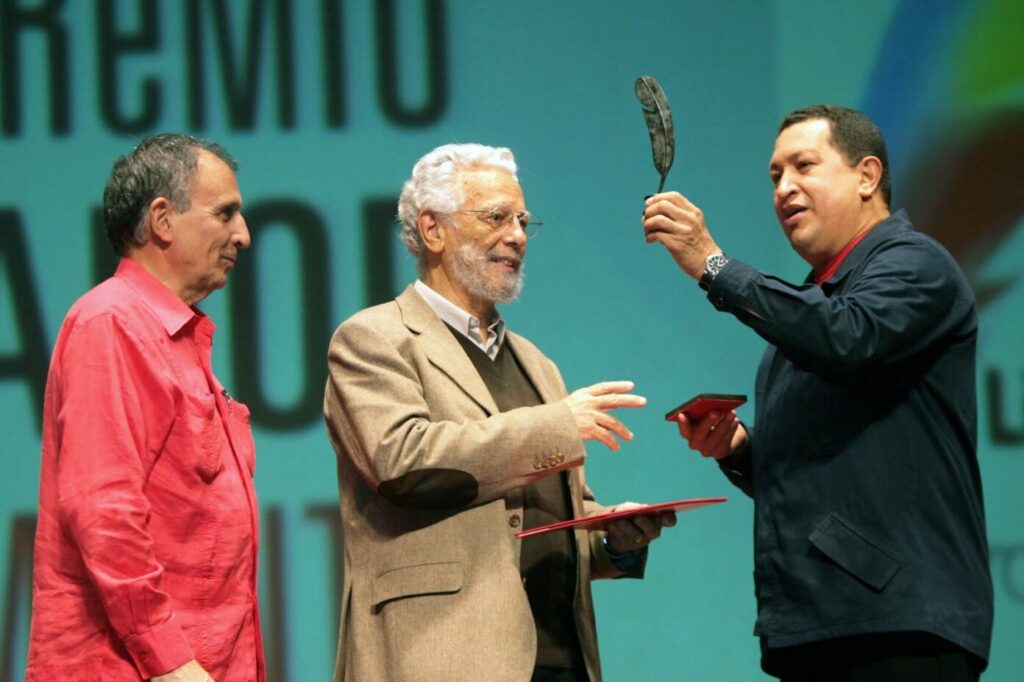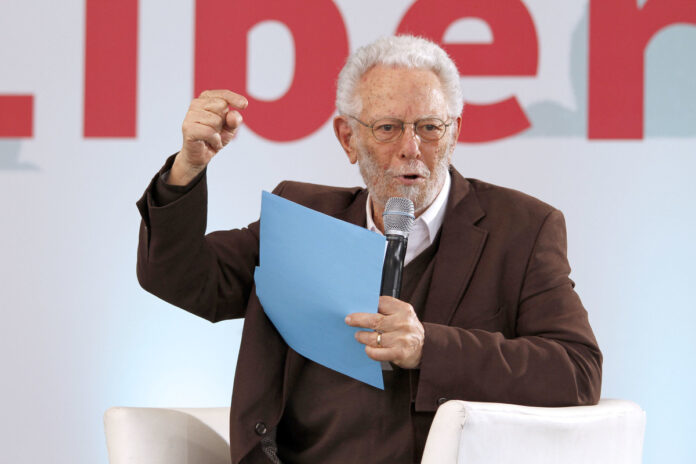Enrique Dussel is for the peoples of the Global South what Hegel was for the European bourgeoisies of the 19th century. Like the philosopher from Stuttgart, the man from Mendoza decided to rethink everything, developing a systematic and rigorous, but above all committed and radical way of thinking. His attentive and voracious gaze has gone through almost every field: philosophy, history, theology, ethics, politics, geopolitics, anthropology, archaeology, pedagogy, aesthetics and erotica.
But comparing Dussel to Hegel means pointing out all that is antagonistic to the great philosopher of the German and global bourgeoisie: Dussel makes a case for liberation where slavery was justified, promotes decolonization in the face of the permanence of coloniality, affirms the historicity of America in the face of Western concealment, weighs the collective and the communitarian against liberal individualism, defends intrinsic human dignity in the face of racism, patriarchy and capital.
Enrique Dussel is one of the main animators of the philosophy of liberation, a movement he founded in 1971 together with thinkers such as Mario Casalla, Rodolfo Kusch, Horacio Cerruti Guldberg, Arturo Andrés Roig and others. His background is rooted in Marxism and Christianity, he ties together ethics and politics, and draws on what he has called the “decolonizing turn”, a frontal critique of Eurocentrism and Westernism formulated from the countries of the Global South.
Dussel was born in the province of Mendoza, Argentina, in 1934. He studied philosophy at the University of Cuyo, worked as a carpenter in Nazareth, and specialized in history and theology in Paris. On his return to his native country, and with the advent of the 1976 civil-military dictatorship, he was expelled from the university, and his intellectual work was censored. Finally, a bomb attack on his home by paramilitary groups forced him to go into exile in Mexico, where he developed most of his work. His entire vast body of work, which exceeds 50 volumes, is available on his own website, in open access for the study of researchers, teachers and grassroots activists.
Known for his closeness to social movements, Dussel has made no excuses or qualms about devoting part of his time to his work as a teacher and trainer of grassroots activists. He is currently one of the organizers of the Escuela Descolonial in Caracas and secretary of political training for MORENA in Mexico. His unrestricted defense of processes such as the Cuban Revolution, the process of change in Bolivia, and the Bolivarian Revolution in Venezuela, has led him into bitter polemics with other decolonial theorists. Below is the interview he generously granted us.
Lautaro Rivara: In “Carta a los indignados”, a book that is now a decade old, you referred to yourself as “an old militant”. What does militancy, exercised from the intellectual field, mean to you? What are the main trends and challenges of our time?
Enrique Dussel: Being a militant means opposing the reality we live in. The philosophy of liberation that I practice and contributed to founding was born many years ago, on the part of a generation that is now ending its days: we could say that it was born in 1968, although the Cuban Revolution, which was very important, took place a decade earlier. We were greatly influenced by the reading of Herbert Marcuse, Paulo Freire, Frantz Fanon, the great intellectual and militant figures of that time.
Today, after more than 50 years, I continue to militate from philosophy, from the weapons of thought, I continue to study and think about the new issues of Latin America. But I am always passionate to return to José Martí, to José Carlos Mariátegui, to all those who thought about the need for a second emancipation. Because Latin America was able to emancipate itself from Spain and Portugal, only to be subjected to neo-colonialism under the aegis of the United States, which has considered us its backyard since the Monroe Doctrine.
“Because of the emergence of the industrial power that is China, because of the military balance established with Russia, and because of the lack of leadership in the United States (…) we are facing the possibility of a second emancipation”
All the coups d’état promoted by the United States, or by European states, sought to guarantee our subordination, our economic exploitation. Any force that opposed them was declared communist, the coup was promoted and the military was placed at the head of the state. This was the case, for example, of the coup against Jacobo Arbenz in Guatemala in 1954, which marked the beginning of a strong US presence in Latin America.
In my works on political philosophy, I never fail to recall the history and reality of the United States. It is often considered a developed country, with a democratic population. But it is a country of enormous contradictions, a racist one, guided by the ideals of Hollywood, the American bourgeoisie, the IMF, and so on.
I believe that because of the emergence of the industrial power that is China, because of the military balance established with Russia, and because of the lack of leadership in the United States – today in full crisis – we are perhaps facing the possibility of a second emancipation, which will allow us to place ourselves on an equal footing with the North Americans. If not, we will establish better relations with China, a country with a long history that we ignore, which was an industrial power long before Europe and the United States. American hegemony is coming to an end, and we can see that with the New Silk Road, which already reaches as far as Argentina. Europe is also running out of air, torn between East and West. This is a very present issue, that of our second emancipation.
It seems that the crisis of the OAS – a foreign ministry of colonies – will lead to its replacement by CELAC, an instrument that is strengthened by Andrés Manuel López Obrador’s foreign policy. This is quite a step forward.
L.R.: You have repeatedly spoken out about the lack of intellectual self-esteem and the bureaucratic nature of academia in peripheral countries. And you were also critical of some decolonial intellectuals who broke with the most advanced processes in the region. What is the relationship between decoloniality and anti-imperialism?
E.D: Decoloniality and anti-imperialism must go hand in hand: they must be a single movement. We must overcome this colonial mental situation in which we live: we must overcome the model of the Latin American intellectual who is always quoting North American and European authors, a victim of a tremendous epistemological colonialism. We must also drink from our own springs. We are, however, going through a process of epistemological decolonization: we have new problems, and above all our own problems, which are not those of Europeans and North Americans. If we continue to imitate them, looking for the latest author in vogue, then we will no longer be able to think on our own. We must read our authors, know our political, intellectual and historical traditions.

Today, a decolonial intellectual, a militant intellectual, must take sides with all these medium-term processes, thinking in the long term about overcoming capitalism, building an ecological society, overcoming the use of oil and non-renewable energies. We are in a time of great changes: philosophy and critical thinking must take note of these things. Also of the pandemic, which showed the failure of neoliberalism, handing over health to private capital. This reality urgent demands that we think about what is happening and requires a great intellectual and political commitment, of a militant kind. We must take up all our great ideals and apply them to attainable ends. This situation, I insist, gives us a window of opportunity to advance in a second emancipation.
L.R.: Now I propose that we talk about religion. From your theological and Marxist background, how would you characterize the exponential growth of neo-Pentecostal evangelicalism in the region? You used to say that “socialism is beneath Christianity”. What lies beneath the new evangelicalism?
E.D.: The Catholic tradition bore two distinct fruits: one, obsessed with traditional issues, private property, which accepted the dominance of capital and at most proposed some reforms. This one feeds directly into right-wing currents. But there is another fruit, in liberation theology, and today in the Pope himself, which expresses a much more progressive and popular position.
“We need a robust State to obediently serve the demands of the people. But we also need to challenge the State as we know it”
The neo-Pentecostal churches, many of them of US origin and influence, have an ideology that is much more coherent and appropriate to dependent capitalism. Unfortunately, in many cases, as happened recently in Bolivia, some sectors fervently support coups d’état, becoming anti-popular and, theologically, anti-Christian movements. For them, Latin American popular religiosity is seen as an infiltration into Christianity that must be denied. They take some texts from the Bible, and give them a capitalist and individualist reading, like the de facto president Jeanine Áñez, when she entered the palace with a bible in her hand, scorning the wiphala, the Quechua-Aymara flag. This idea of fighting with the gospel against indigenous symbols is an aberration, typical of a conservative, neo-liberal and pro-US Christianity.
L.R.: I would now like to ask you about the old and the new right in Latin America and the Caribbean and about your political theses. Many debates have taken place and will continue to take place about the place of democracy in the face of the attack from increasingly racist, violent, misogynist and anti-democratic minorities. Which democracy should be defended and which should be built?
E.D.: We have to start by differentiating representative democracy from democratic participation of the people. The question is to create institutions where the people can constitutionally participate in government. In Venezuela, for example, there is a representative power, but there is also a participatory power, which is organized at the grassroots, where the people have the possibility of coming together in the neighborhood, in larger collectives, and then making demands on the representative power.
We have to imagine a new type of State, not the annulment of the State as if it were intrinsically perverse. We need a strong state to defend ourselves, for example, against imperialism. We need a robust State to obediently serve the demands of the people. But we also need to challenge the State as we know it. We need to ensure that the people can participate, that it is not only representative, that it is not reduced to a bureaucratic elite that governs from the top down. Political institutions must be changed from the bottom up to put a limit on representation. Participation cannot be only incidental, through some kind of plebiscite or consultation: participation must be organic, with the constant presence of the people, with institutions built for that purpose. Of course, that calls for a radically new type of State, a revolution with the institutional participation of the people.
L.R.: In debate with different liberal currents, you have said that, at least in the Global South, we were always a community, we were never individuals. Considering the view of the state that you have just shared with us, what is the role of the community? What role does the community play in the processes of political decolonization and in the face of the intense processes of individualization that we have been experiencing?
E.D.: The liberal regime thought only of a representative type of organization, where the elite, especially the rich elite, the wealthiest, manage to impose their candidates. In theory the people vote, but in reality they only confirm what the elite have already chosen. This is essentially how the American plutocratic system works. The revolutionary way will be to organize people’s participation institutionally, from the bottom up,. What we need is to strengthen the community: grassroots meetings in the neighborhood, processes of direct democracy that work their way upwards towards the constitution of a participatory national power. We need to learn from the Venezuelan constitution, which recognizes five powers: executive, legislative, judicial, citizens’ and electoral, which in turn is also elected. All institutions, from churches to football clubs, must be democratized. We must create a five-power state so that there is real participation of the people, today manipulated by spurious, undemocratic leadership. This is a central issue in ideology, in the definition of the state, and in community-building. Because, in the end, that is what we are: community.
________________________________________
This interview is part of issue 555 of ALAI’s magazine, which can be downloaded in full in Spanish here.








